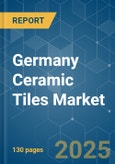Germany is one of the European region's major markets for ceramic tiles. The country has the benefits of highly developed and most advanced ceramic products like roof tiles, bricks, sanitary ware, etc. The significant consumer expenditure on residential and housing construction is another factor that benefits the market growth. The booming prospects of the construction sector are attributed to state investments and low-interest rates. The rising demand for new residential infrastructures is the principal factor influencing the German ceramic tiles market growth. Germany is one of the significant producers of kaolin in the European region.
In Germany, the ceramic tile market has grown similarly. Imports of tiles in 2020 climbed by 9.8%, totaling 113.6 million square meters. According to statistics, average import prices range from 4.00 to 13.85 euros per square meter. Frequently, a larger volume was purchased at a lower price. Italy's imports remain stable at roughly 60.2 million square meters, followed by Turkey (14.7 million square meters), Spain (11.2 million square meters), Poland (11.2 million square meters), and the Czech Republic (7.5 million square meters). The increased imports can be explained by the fact that after their home market collapsed, manufacturers in other countries shifted to the stable German market. At the same time, this shift means that German manufacturers, who export around a third of their products, have lost a significant export market in some situations.
Germany Ceramic Tiles Market Trends
Rising Construction Activities are Driving the Market
Increasing construction spending is the key factor in driving the ceramic tiles market in Germany. The high adoption rate of ceramic tiles in the interior construction industry and high revenue generation from the floor tiles are anticipated to boost the German ceramic tiles market growth. Due to the promising construction industry in Germany, the demand for ceramic tiles is expected to accelerate over the projected period. Rapid industrialization and urbanization have resulted in increased residential, commercial, and industrial construction activities, thereby escalating the demand for ceramic tiles. Germany had a general increase in the total number of permits issued for residential property construction between 2007 and 2020. In that period, the total number of permits issued increased from 182 thousand to over 368 thousand, an increase of over 100%.Floor Segment is Driving the Market
Ceramic tiles are made from fine, denser clay and fired at extreme temperatures, offering superior durability to the flooring with exposure to high traffic. Developing new products and hassle-free installation techniques have considerably driven the ceramic tiles market in commercial flooring. Ceramic floorings are emerging as cost-effective and eco-friendly solutions in various sectors, including healthcare and institutional buildings, owing to the product's antibacterial, anti-slip, and water-resistant properties. Factors such as consumers seeking stylish and less expensive flooring options and escalating demand for high-quality floor tiles will contribute to the growth of the German ceramic tiles market.Germany Ceramic Tiles Industry Overview
The report covers major international players operating in the German Ceramic Tiles Market. Regarding market share, some of the major players currently dominate the market. However, with technological advancement and product innovation, mid-size to smaller companies are increasing their market presence by securing new contracts and tapping new markets.Additional Benefits:
- The market estimate (ME) sheet in Excel format
- 3 months of analyst support
This product will be delivered within 2 business days.
Table of Contents
Companies Mentioned (Partial List)
A selection of companies mentioned in this report includes, but is not limited to:
- Villeroy & Boch
- Agrob Buchtal
- Argelith Ceramic Tiles Inc
- Porcelaingres GmbH
- Refratechnik Ceramics GmbH
- Golem
- Alois Korzilius Interbau.
- klingenberg dekoramik gmbh
- Tonality gmbh
- Steuler Fliesen GmbH*








